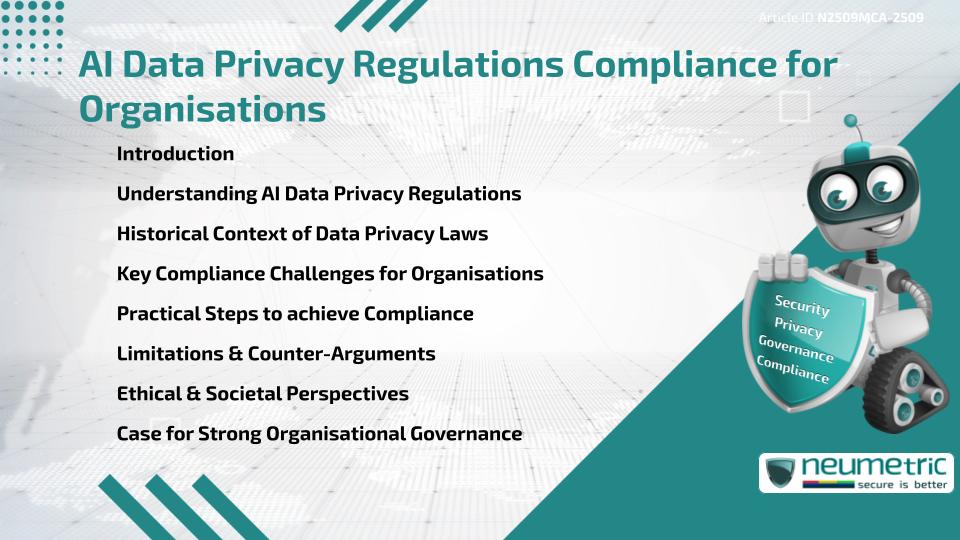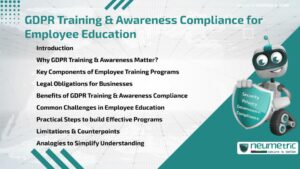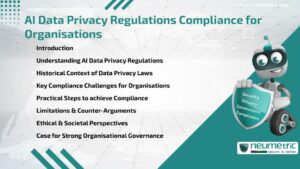Table of Contents
ToggleIntroduction
Artificial Intelligence is transforming how businesses handle Personal Information, but it also raises serious concerns about security & accountability. AI Data Privacy regulations compliance for organisations ensures that Sensitive Data is collected, stored & processed within lawful boundaries. These regulations not only protect individuals from misuse but also safeguard companies from Financial penalties & reputational damage. From the European Union’s General Data Protection Regulation [GDPR] to the California Consumer Privacy Act [CCPA], laws across the world demand strict oversight. For organisations, compliance means understanding legal requirements, implementing robust data Policies & promoting transparency.
Understanding AI Data Privacy Regulations
AI Systems often rely on massive amounts of Personal Data to train algorithms, detect patterns & deliver insights. However, this reliance raises questions such as: How much Personal Data is necessary? Who controls its use? Regulations like GDPR, CCPA & Brazil’s Lei Geral de Proteção de Dados [LGPD] provide answers by mandating User consent, limiting data collection & requiring accountability mechanisms. For businesses, this means building clear consent models, allowing users to opt out & ensuring data is processed fairly. More details on GDPR can be found here.
Historical Context of Data Privacy Laws
Data Privacy Regulation is not a new concept. The first major milestone came with Germany’s Federal Data Protection Act of 1970, followed by broader frameworks such as the OECD Guidelines of 1980. Over time, these frameworks evolved to address emerging Risks from digitalisation & now Artificial Intelligence. Today, AI Data Privacy regulations compliance requires organisations to not only follow existing legal standards but also prepare for continuous updates as technology advances. For an overview of international Data Privacy history, see this resource.
Key Compliance Challenges for Organisations
Organisations face several difficulties when trying to meet compliance standards.
- Complex legal frameworks: Different countries apply different rules, creating conflict for global businesses.
- Volume of data: AI Models often need large datasets, which increases the Risk of exposure.
- Technical limitations: Many organisations struggle to anonymise or pseudonymise data effectively.
- Resource allocation: Smaller firms may lack the budget or expertise to comply fully.
The European Data Protection Board provides further guidance on cross-border compliance issues.
Practical Steps to achieve Compliance
Organisations can follow structured steps to strengthen their compliance posture:
- Conduct regular Data Protection impact assessments.
- Minimise the data collected & ensure it serves a clear purpose.
- Implement Access Controls & encryption technologies.
- Train staff on Privacy practices & accountability.
- Establish a Governance team dedicated to monitoring compliance.
For practical advice on secure AI use, see NIST’s Privacy Framework.
Limitations & Counter-Arguments
Some critics argue that compliance frameworks slow down innovation. AI research often requires flexibility, but strict Privacy rules may restrict data availability. Others claim that regulations are sometimes vague, leaving organisations uncertain about the exact steps required. However, without regulation, the Risks of exploitation, identity theft & discriminatory decision-making would increase significantly. Thus, AI Data Privacy regulations compliance must strike a balance between innovation & security.
Ethical & Societal Perspectives
Beyond legal obligations, there is an ethical dimension. Organisations are stewards of trust, responsible for protecting the Personal Data of customers, Employees & Stakeholders. In societies where trust in digital systems is fragile, breaches can have lasting consequences. Ensuring Ethical AI Practices also reduces bias & discrimination in automated decisions. The World Economic Forum highlights ethical AI as a cornerstone of sustainable digital economies.
Case for Strong Organisational Governance
Organisations that embed Privacy within their culture are better equipped to navigate regulations. Strong Governance involves leadership commitment, regular Audits & a culture where Privacy is prioritised at every stage of AI Development. This not only prevents penalties but also builds Customer loyalty & brand resilience.
Takeaways
- AI Data Privacy regulations compliance protects organisations from Financial & reputational harm.
- International laws such as GDPR, CCPA & LGPD set strict obligations.
- Compliance requires technical, organisational & ethical measures.
- Challenges include complexity, cost & limited clarity, but strong Governance can overcome them.
FAQ
What is AI Data Privacy regulations compliance?
It refers to the process of ensuring that organisations meet legal, technical & Ethical Standards when handling Personal Data in AI Systems.
Why is AI Data Privacy regulations compliance important for businesses?
It protects businesses from legal penalties, reduces reputational Risks & strengthens Customer Trust.
Which laws govern AI Data Privacy regulations compliance?
Key laws include GDPR in the European Union, CCPA in the United States & LGPD in Brazil.
What challenges do organisations face in compliance?
Organisations face challenges such as varying Global Laws, high data volumes & resource limitations.
How can organisations achieve compliance effectively?
By conducting impact assessments, minimising data collection, training staff & adopting strong encryption & Governance measures.
Does compliance slow down AI innovation?
Some argue it does, but compliance ensures responsible innovation that protects users from harm.
What role does ethics play in AI Data Privacy regulations compliance?
Ethics ensures fairness, transparency & trust, going beyond the legal minimum requirements.
Need help for Security, Privacy, Governance & VAPT?
Neumetric provides organisations the necessary help to achieve their Cybersecurity, Compliance, Governance, Privacy, Certifications & Pentesting needs.
Organisations & Businesses, specifically those which provide SaaS & AI Solutions in the Fintech, BFSI & other regulated sectors, usually need a Cybersecurity Partner for meeting & maintaining the ongoing Security & Privacy needs & requirements of their Enterprise Clients & Privacy conscious Customers.
SOC 2, ISO 27001, ISO 42001, NIST, HIPAA, HECVAT, EU GDPR are some of the Frameworks that are served by Fusion – a SaaS, multimodular, multitenant, centralised, automated, Cybersecurity & Compliance Management system.
Neumetric also provides Expert Services for technical security which covers VAPT for Web Applications, APIs, iOS & Android Mobile Apps, Security Testing for AWS & other Cloud Environments & Cloud Infrastructure & other similar scopes.
Reach out to us by Email or filling out the Contact Form…





